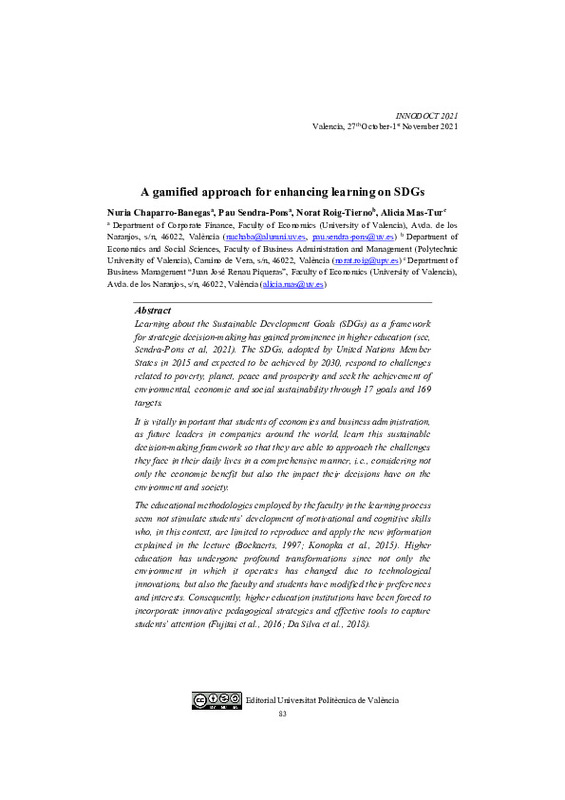JavaScript is disabled for your browser. Some features of this site may not work without it.
Buscar en RiuNet
Listar
Mi cuenta
Estadísticas
Ayuda RiuNet
Admin. UPV
A gamified approach for enhancing learning on SDGs
Mostrar el registro sencillo del ítem
Ficheros en el ítem
| dc.contributor.author | Chaparro Banegas, Nuria
|
es_ES |
| dc.contributor.author | Sendra-Pons, Pau
|
es_ES |
| dc.contributor.author | Roig Tierno, Honorat
|
es_ES |
| dc.contributor.author | Mas Tur, Alicia
|
es_ES |
| dc.date.accessioned | 2022-10-26T11:57:36Z | |
| dc.date.available | 2022-10-26T11:57:36Z | |
| dc.date.issued | 2022-01-19 | |
| dc.identifier.isbn | 9788490483657 | |
| dc.identifier.uri | http://hdl.handle.net/10251/188753 | |
| dc.description.abstract | [EN] Learning about the Sustainable Development Goals (SDGs) as a framework for strategic decision-making has gained prominence in higher education (see, Sendra-Pons et al, 2021). The SDGs, adopted by United Nations Member States in 2015 and expected to be achieved by 2030, respond to challenges related to poverty, planet, peace and prosperity and seek the achievement of environmental, economic and social sustainability through 17 goals and 169 targets. It is vitally important that students of economics and business administration, as future leaders in companies around the world, learn this sustainable decision-making framework so that they are able to approach the challenges they face in their daily lives in a comprehensive manner, i.e., considering not only the economic benefit but also the impact their decisions have on the environment and society. The educational methodologies employed by the faculty in the learning process seem not stimulate students’ development of motivational and cognitive skills who, in this context, are limited to reproduce and apply the new information explained in the lecture (Boekaerts, 1997; Konopka et al., 2015). Higher education has undergone profound transformations since not only the environment in which it operates has changed due to technological innovations, but also the faculty and students have modified their preferences and interests. Consequently, higher education institutions have been forced to incorporate innovative pedagogical strategies and effective tools to capture students’ attention (Fujitai et al., 2016; Da Silva et al., 2018). By integrating traditional learning with other activities such as debates and teamwork, active learning methodologies place the student as the cornerstone of the learning process (Prince, 2004; Recatalá, 2016; Sendra-Pons et al., 2020). In this way, students abandon passive attitudes and adopt a behavior based on collaboration, communication between individuals, cooperation, and problem-solving. In recent years, the faculty is employing new innovative learning techniques such as gamification and role-playing to engage students’ participation (see, e.g., Çakıroğlu et al., 2017; or Martínez & Ruiz, 2019). In the field of education and learning, gamification is defined as the introduction of a series of processes and activities that, through the use and application of game mechanics, solve challenges related to teaching (Kim et al., 2018). Similarly, role-playing includes representational games where individuals act according to different roles and situations while developing critical thinking, professional knowledge, and moral values (Vizeshfar et al., 2016). The innovative education experience presented here introduces gamification and role-playing as active learning methodologies to immerse participants in strategic decision-making that resembles reality by constraining their action to the limitations of their role and available resources. In this way, students not only apply the formal knowledge acquired in class but also develop soft skills such as teamwork and problem solving when cooperating between the different roles within a company. The results of this innovation, evaluated through a survey with Likert, rating and open-ended questions as well as word maps with which the students gave their impressions on this educational experience, show high levels of student satisfaction with the methodologies employed, considering them particularly suitable for learning about the SDGs. Additionally, students claimed that higher participation and cooperation were achieved compared to traditional methodologies of education. Based on the detailed analysis of the usefulness of this activity derived from the evaluation methods mentioned above, the use of gamification and role-playing in higher education is recommended even though it is necessary to replicate this activity to confirm results. | es_ES |
| dc.description.sponsorship | Norat Roig-Tierno wishes to thank Project [GV/2019/063], funded by the Generalitat Valenciana, for supporting this research. | es_ES |
| dc.format.extent | 3 | es_ES |
| dc.language | Inglés | es_ES |
| dc.publisher | Editorial Universitat Politècnica de València | es_ES |
| dc.relation.ispartof | Proceedings INNODOCT/21. International Conference on Innovation, Documentation and Education | |
| dc.rights | Reconocimiento - No comercial - Compartir igual (by-nc-sa) | es_ES |
| dc.subject | Sustainable Development Goals (SDGs) | es_ES |
| dc.subject | Role-playing | es_ES |
| dc.subject | Gamification | es_ES |
| dc.subject | Innovative education | es_ES |
| dc.title | A gamified approach for enhancing learning on SDGs | es_ES |
| dc.type | Capítulo de libro | es_ES |
| dc.type | Comunicación en congreso | es_ES |
| dc.relation.projectID | info:eu-repo/grantAgreement/GV//GV%2F2019%2F063 | es_ES |
| dc.rights.accessRights | Abierto | es_ES |
| dc.contributor.affiliation | Universitat Politècnica de València. Facultad de Administración y Dirección de Empresas - Facultat d'Administració i Direcció d'Empreses | es_ES |
| dc.contributor.affiliation | Universitat Politècnica de València. Departamento de Economía y Ciencias Sociales - Departament d'Economia i Ciències Socials | es_ES |
| dc.description.bibliographicCitation | Chaparro Banegas, N.; Sendra-Pons, P.; Roig Tierno, H.; Mas Tur, A. (2022). A gamified approach for enhancing learning on SDGs. En Proceedings INNODOCT/21. International Conference on Innovation, Documentation and Education. Editorial Universitat Politècnica de València. 83-85. http://hdl.handle.net/10251/188753 | es_ES |
| dc.description.accrualMethod | OCS | es_ES |
| dc.relation.conferencename | INNODOCT 2021 | es_ES |
| dc.relation.conferencedate | Octubre 27-Noviembre 01, 2021 | es_ES |
| dc.relation.conferenceplace | Valencia, España | es_ES |
| dc.relation.publisherversion | http://ocs.editorial.upv.es/index.php/INNODOCT/INN2021/paper/view/13385 | es_ES |
| dc.description.upvformatpinicio | 83 | es_ES |
| dc.description.upvformatpfin | 85 | es_ES |
| dc.type.version | info:eu-repo/semantics/publishedVersion | es_ES |
| dc.relation.pasarela | OCS\13385 | es_ES |
| dc.contributor.funder | Generalitat Valenciana | es_ES |






